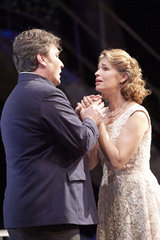| Opera Reviews | 25 April 2024 |
Ludovic TÚzier excels as Wertherby Moore Parker |
|
| Massenet: Werther Vienna State Opera 31 March 2017 |
|
|
The transposed version is certainly an acquired taste, with familiar melodic lines compacted and harmonised, leaving the occasional high note for climactic effect. Naturally, cast with a further baritone (Albert) and Charlotte as a mezzo (which need not necessarily be the case), the work risks becoming rather leaden in terms of overall sonic spectrum. In addition, the lower-lying Werther tends to sound more mature with a darker vocal colour. Indeed - apparent age was a slight issue in this revival, with the thwarted lovers seeming a touch too mature to be quite ideal. However, if anyone can justify the lower Werther version, it is Ludovic Tézier - who, together with his recent performances as Ford (Falstaff) and Il Conte di Luna (Il Trovatore) has now added another jewel to his Viennese crown. He, in fact, created history here in 2012 when becoming the first baritone to sing the part at the State Opera, as replacement for an ailing tenor. Tézier brings a grand artistic and vocal dimension to the part which only occasionally leaves one wishing for a higher-lying interpreter. Opening just a touch introvert, this character declines into a depressive, doomed figure for whom one truly feels sympathy. The French baritone’s vocal prowess and technique are extraordinary - scaling the awkward (essentially tenor) tessitura without a hint of strain and drawing upon reserves which unfailingly impact, emotionally and dramatically. Sophie Koch is, of course, internationally familiar for her Charlotte and her reading remains wonderfully heartfelt, stylish, and intense. Adrian Eröd’s (Albert) association with this production (directed by Andrei Serban) extends back to its premiere run in 2005. His well-considered reading remains a touch understated and synchronises well with his vocal resources - never forced or coerced into attempted rivalry with his baritone colleague - although, oddly, noticeably a shade under pitch at times on this evening. Giving her Vienna Sophie debut, ensemble-member Maria Nazarova nicely-contrasted with the dispirited tones of her colleagues, vivacious and playful, and generally singing accurately with her well-projected (if a touch metallic) soprano. The supporting roles were well characterised with Alexandru Moisiuc (a rather severe Le Bailli), Peter Jelosits (Schmidt), Markus Pelz (Johann) as a delightful comic duo, and the animated members of the State Opera’s junior school guaranteeing light relief from the unfolding drama. Frédéric Chaslin conducted a romantic, but slightly reserved, reading - attentive of his stage forces and in consummate control throughout the evening. At the curtain, however, M. Tézier was the evening’s hero.
|
|
| Text ©
Moore Parker Photo © Wiener Staatsoper / Michael Pöhn |

 Following the 1890 success of Massenet’s Manon at the Hofoper (Imperial Opera) in Vienna, the management asked for a further work from the composer. It so happened that Massenet had Werther (which had been rejected by the Opéra Comique as too serious) waiting in the wings. 1892 saw it’s Vienna (and world) premiere, performed in German, and with the title role created by the legendary tenor Ernst van Dyck - who had been Vienna’s Des Grieux and was a regular Wagnerian at Bayreuth. Massenet thereafter arranged the male lead for the great Italian baritone Mattia Battistini, for a 1902 showing in St. Petersburg.
Following the 1890 success of Massenet’s Manon at the Hofoper (Imperial Opera) in Vienna, the management asked for a further work from the composer. It so happened that Massenet had Werther (which had been rejected by the Opéra Comique as too serious) waiting in the wings. 1892 saw it’s Vienna (and world) premiere, performed in German, and with the title role created by the legendary tenor Ernst van Dyck - who had been Vienna’s Des Grieux and was a regular Wagnerian at Bayreuth. Massenet thereafter arranged the male lead for the great Italian baritone Mattia Battistini, for a 1902 showing in St. Petersburg.





